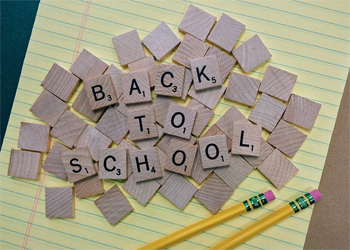Cheryl Fingleson From Holidays To Classroom Interview

Cheryl Fingleson From Holidays To Classroom Interview
Cheryl Fingleson, children's sleep consultant, The Sleep Coach shares her tips to ensure that the transition from pre-school to school goes smoothly.
Suddenly these little ones are faced with a defined schedule and will need to sit for longer periods than they are used to and adhere to a stricter daily schedule. This comes after a long holiday where routines have been relaxed for many children.
The most important thing is to get back into a routine and work on getting your children to sleep early so that you both have enough sleep to fully function and concentrate during the day.
Consistent Sleep Time Routine
1. Decide if your child is going to eat early or a little later with the family.
You don't want your child eating too early, as they will be hungry before bed, or too late, as they will feel uncomfortable.
2. Play outside before dinner or bath time
Ensuring a good sleep routine starts in the late afternoon when your children should be playing outside. This has to do with the length of the waves of sunlight, the long waves of sunlight, dusk triggers the production of Melatonin - the sleep hormone. So, after your child has played outside, it's either dinner or bath time.
3. 15 minutes of Quiet time in bed.
This should be in their bedroom. Read, play gentle music and then tuck your child in, kiss and cuddle good night and leave. Make sure that your child is completely ready for bed. eg. your child has been to the toilet, had a drink of water, brushed teeth
4. Your school aged child should fall asleep in the dark. Falling asleep in the dark is very important as it helps promote the production of Melatonin, the hormone that helps get us to sleep.
Get prepared the night before
A stress-free morning starts with an organised evening routine.
Check the school timetable with your child. When your children are involved in this step, you encourage them to develop responsibility for their possessions and time management.
Together, you can put a checklist of what you need to prepare the night before which might include:
School uniform (shoes, socks, sports uniform etc.)
Packed lunches - make any sandwiches and prepare all food so it's ready to go
Sign any letters or paperwork for the school
Pack the school bag
Morning routine:
Get up early
Ensure that everyone wakes up with more than enough time to get everything done so work out how much time you may need and then add on another 20 minutes.
Plan breakfast
Most children are easier to feed if they are given only two options. A great idea is to have breakfast before getting dressed to avoid last-minute messes, which may need a change of uniform. Some children don't feel hungry at home, then become ravenous on the way to school. If that's the case, you could give them a sandwich, cereal bar or perhaps some fresh fruit to take with them so they have something to eat before school starts.
Getting dressed is a time-consuming task for primary school children, who are often easily distracted by other far more interesting activities. Allow additional time for this.
Interview with Cheryl Fingleson
Question: How does the transition from pre-school to school affect a child's sleeping?
Cheryl Fingleson: There are many different ways parents can help pre-schooler if they feel unsettled with starting school. The best way we can assist pre-schoolers eliminate sleep disturbances is to have a good routine. A relaxed, quiet, comfortable and secure environment.
Children are generally very tired when they first start school. Bedtime may vary a lot from child to child. Some may go to bed at 6.30pm, while others go to bed later.
The school environment is much more formal and it takes time to feel less stressed with the changes.
It is not uncommon for parents to find that their children are anxious and have separation anxiety. Talking through things that have happened through the day will help, a few more hugs and kisses goes along way.
Bed time should be between 6.30-7.30 pm. NO later.
Question: What type of sleep routine should a prep-aged child be in?
Cheryl Fingleson: It is a good idea to allow your child to have some time outside when they get home from school. Good to get some of that pent up energy released.
-Dinner around 5.30pm (if that is too early for family having dinner together so family dinners for the weekend)
-Bath
-Play with a puzzle, books or lego something quiet and subdued
-Something to drink
-Brush teeth
-Story
-Prayers, hugs and kisses
-Dim lights or switch off lights and into bed
If we keep to the same routine every night, although the time may vary slightly your child will be very aware of what is coming next. With each step towards bedtime Melatonin is released naturally in the body. Melatonin is the sleep hormone which helps us unwind, relax and go to sleep.
N.B. NO SCREENS half an hour to an hour before bedtime. The blue light stimulates the brain and gets us all wired up making it diddicult to go to sleep.
 Question: How does the time a child should go to bed, change as they age?
Question: How does the time a child should go to bed, change as they age? Cheryl Fingleson: As our child get older the amount of sleep they need in a 24 hours decreases. This is a guide as to what the average child requires at the varies ages. A point to remember is that all children are different, some need more sleep than others.
Birth to 3 months 16 ½ - 15 hours
4 to 18 months between 14 -13 hours
2 to 5 years 13 to 11 hours
6 to 11 years between 10 ¾ hours to 9hours
Question: What advice do you have for parents who struggle to have their younger school-aged children sleep?
Cheryl Fingleson: Does your child have FOMO (fear of missing out) at bedtime?
The best way to overcome any delays at bedtime is to keep to a good routine and be consistent.
Children like adults don't cope well with surprises sprang on them.
A good routine may include dinner, bath, teeth into the room one story, hugs and kisses.
A very good idea is to ask your child to share with you what they did to help someone during the day and any other good thing that may have happened or learned during the day.
Dim lights or lights out.
Question: Is it common that primary-school aged children, wake during the night?
Cheryl Fingleson: Your child's temperament plays a large part in how they may be affected by the different situations.
Often at the beginning of the school year, the start of a term or exams can cause sleep disruptions.
Anxiety, security mixed with other emotions play a large part in sleep disturbances.
A child with a adaptable temperament will adjust easily and accept change in their stride.
A sensitive child will need reassurance and extra support, they like to have a running sheet of the day. Noise and loud sounds disturb them and you will often see then hold their ears to stop the noise.
The child that is perceptive can be -high maintenance' They may need you to explain the steps of what they have to do before bedtime or any request you have in detail with many many questions.
I would say the most challenging temperament is the intense child. These are children that don't wimper or fuss, they SCREAM. When they are happy they are very happy but when they are not WATCH OUT.
So my advice is learn to know your children and help them with the support YOUR child needs. It is not necessary for them to call you when they wake during the night if we have helped them through some of their fears and problems.
Always rule out health issues if your child is waking constantly.
Question: How can parents stop their primary-school aged children waking?
Cheryl Fingleson: If your child goes to sleep too late.
This can be contributing to wakings during the night.
When your child is over tired a hormone called Cortisol is released in the body which acts as adrenaline rush. If your child is overtired it difficult to unwind, settle and fall asleep.
Try stick to the routine as discussed above.
Night-time waking can also be for comfort, reassurance and resettling. When you comfort during the night try be boring and to the point, no lengthy discussion.
Try asking if there is something that would help getting your child back to sleep quickly.
Go to them and quietly reassure them that everything is all ok. Tell them it is still time to sleep and give some soft reassuring words, then walk out of the room.
Question: How long before bed should children eat?
Cheryl Fingleson: A good idea is to keep to the routine, in this way everything works out in the correct timing.
A good guide line is 1 to 1 ½ hours before bed.
Many children of all ages love to come into their parents' bed for a snuggle early in the mornings. Try keep you morning snuggle as long as you can. Children grow so quickly!
Think about the changes happening in your child's life that can cause stress. They may seem minor to an adult, but can be major in the eyes of a child.
As children grow older and become more secure they will not need to be so close to you. Most children no longer need to share their parents' bed or bedroom by the time they are four or five years old, unless something stressful is happening in their lives.
Interview by Brooke Hunter
MORE



